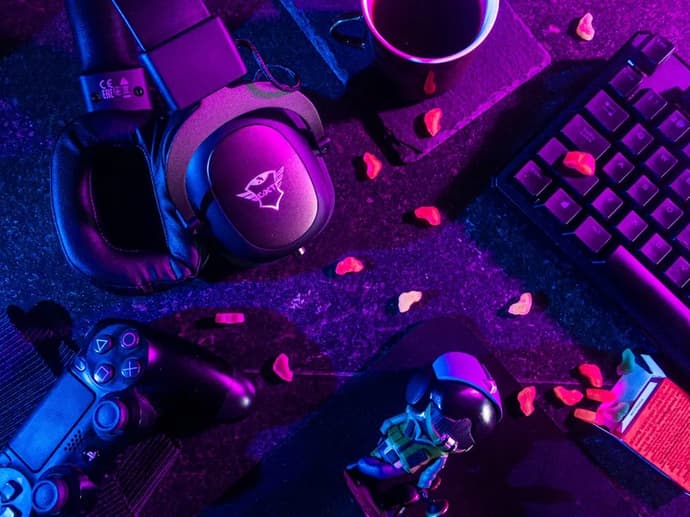
High-Stakes Mindset: How Pro Gamers Handle Tournament Stress

Esports is a very intense and competitive space, where each player walks a tight rope between victory and failure. Paired with the millions of spectators watching live, the pressure can get to those who are unprepared. Many factors contribute to and build up the stress of all Esports players, from the packed arenas to the massive show each large tournament presents. However, this is just the tip of the iceberg, as there are so many other elements such as gaming setups, preparation, and even their team's standings.
In essence, Esports is much like horse racing, as the outcome of each tournament is very unpredictable. Just like the mightiest stallion, teams are favored to lead and win, such as T1 for League of Legends or Team Falcons for Apex Legends. Nonetheless, Esports tournaments are as exciting as they are unforgiving. Even the slightest misstep can lead to a series loss and the end of the story for a team. Behind the scenes, teams invest hours in rigorous practice, detailed game analysis, and team-building activities designed to strengthen trust and improve communication. Players must continually adapt to evolving game metas, new strategies from opponents, and internal pressures to maintain peak performance.
So let’s look at the many challenges professional gamers face as they pave their way to the top.
The Mental Demands of Professional Gaming
To be a professional gamer entails much more than just quick reflexes or a mind quick to adapt and strategize. Alongside these skills, Esports requires top-notch mental fortitude and the ability to face sudden mental challenges from the weight of expectation from fans to the pressure of going to game five in a first-to-three series. Then there is the internal pressure of not letting your team down and ensuring you stay calm so the nerves don’t impact your performance.
All of this is topped with:
- Pressure from sponsors and contracts: Adds stress related to financial stability and expectations.
- Risk of burnout and anxiety: Players face significant mental health challenges from ongoing pressure.
- Emphasis on mental fortitude: Players actively work on mental resilience alongside improving gameplay.
- Recognition by esports organizations: Teams implement routines and activities designed to enhance player mental strength.
Ultimately, professional esports gaming extends beyond skill alone, requiring exceptional mental resilience and strategic emotional management. By recognizing these mental demands and actively supporting player well-being, esports organizations ensure sustainable, high-level performance, setting the foundation for a healthier competitive gaming environment.
Preparation and Routine: Building a Foundation
The life of every professional gamer is quite similar, as they have to practice a lot to keep up with the competition. Top-tier gamers such as these follow meticulously crafted schedules that optimize their performance and mental health. The brunt of the work entails training alone or with their team for 8 to 12 hours a day.
This includes:
- Playing the game actively to gain practical experience.
- Analyzing opponents to understand their strategies and patterns.
- Skirmishing with top teams to test tactics against strong competition.
- Reviewing games afterward to identify mistakes and opportunities for improvement.
Each of these aspects helps improve team synergy and gameplay and upholds individual mechanical performance.
However, for most, this is not enough to remove the anxiety and stress of performing on the big screen. As such, many professionals have implemented pre-match rituals or take days off to decompress ahead of a tournament. Whatever this process is, its goal is always to prepare the player to perform at their best. Additionally, most professionals put a lot of value on their rest and recovery. By prioritizing sleep and their health, their breaks are more effective, and they won’t fail due to built-up strain.
This consistent focus on their own health and mental well-being is what allows professionals to go into tournament day with a clear head. However, once they are at the stage and the reality of the event sets in it can become a whole different story.
Coping Techniques During Competition
Even with solid preparation and a lot of training, the stress of live games and competition can get under the skin of professionals. As a way to combat this, most players use their pre-game rituals as coping techniques to manage anxiety and regain focus so they can perform. For most, this process is done just by warming up and preparing themselves to play their best. This works well as it reinforces the players in their performance and capability where it truly matters, in-game.
Others may take a more traditional route:
- Using traditional calming methods such as visualization and breathing exercises.
- Taking mindful moments before or between games to reset mental focus.
- Building strong team camaraderie to maintain calmness and readiness.
- Open communication and mutual support help teammates overcome setbacks and rebuild mental resilience.
All of these strategies are crucial to creating moments of calm during the tournament. These moments are crucial points for strategizing and preparing the team for the next game of the day.
The Role of Team Dynamics and Support Systems
Most Esports are team-based games such as League of Legends, Counter Strike 2, or Apex Legends. In each individual talent matters a lot, but falls into the backline if there is no teamplay and effective communication.
As such, many Esports organizations have fostered healthy team dynamics with set roles to streamline the player experience:
- In-game leader designation: One player takes responsibility for major decisions, improving team coordination.
- Mutual trust and synergy: Teams quickly adapt to situations through emotional support and effective communication.
- Strong player understanding: Deep connections help teams rise to elite performance levels.
- Regular scrimming sessions: Provide previews of match-day performance, enabling refinement through constructive feedback.
- Inclusive environment: Ensuring all team members feel valued and included, preventing resentment.
Organizations such as T1 in League of Legends are an amazing example of what it means to have a unified team. At their team’s core, they have Faker, one of the best players of all time and a seasoned veteran, in the role of IGL. With his game knowledge and long career, he is able to guide the team through their games effectively. T1’s team has spoken about the value of mutual respect and a positive team environment. They stated that this has given them a better ability to synergize and handle stressful situations during tournaments.
Outside of the game, organizations and teams improve team dynamics through teambuilding exercises. Be it team trips or simply playing a more casual game can foster camaraderie and help create a healthy environment. Ultimately, the goal is a more cohesive and unified team that can handle anything a series throws at them.
Learning from Setbacks and Defeat
In Esports, even the most significant players and teams face defeat, be it just one game out of a set or the whole thing. It is an unavoidable part of the field due to the cost of each minor mistake. For players, it is essential to keep calm after defeats or losing games and try to respond to the setbacks effectively. Ultimately, if all is lost, the team can always review the game and see what went wrong and where they can improve.
This is a core skill of any professional gamer in the game for the long run. Losses, especially those during scrims, are not at all failures but opportunities to improve and optimize. Players who adopt this mentality toward their losses get to dissect their mistakes constructively and plan with their team how to perform better. Additionally, this mentality makes taking losses at home much easier compared to taking each loss as a hit to their skill.
Learning from setbacks has become so popular that it is now commonly known as VOD reviews:
- VOD reviews: Teams or individuals review gameplay footage to identify errors and growth opportunities.
- Analytical and transparent approach: Reduces emotional responses to poor performances.
- Improvement-focused mindset: Encourages players to embrace mistakes and recognize strengths.
- Mental clarity after losses: Helps players objectively evaluate defeats, recognizing factors like bad luck.
- Faster emotional recovery: Players avoid dwelling on past mistakes, improving readiness for subsequent games.
- Increased rebound potential: Players regain control quickly, often surprising overconfident opponents.
Conclusion
Esports is a challenging space to thrive in because of the massive stress that massive tournaments and performing well put on players. Even the best of the best can’t avoid it, but they have learned to subdue it. By focusing on their own well-being and sticking to healthy routines, players can reinforce their mental resilience. Most do this by utilizing personalized rituals or routines that prepare them to stay calm and perform during tournaments.
In recent years, mental strength and health have slowly become a larger focus point in the Esports industry. Teams are preparing their players to face the stress of competition and keep their performance metrics up. This will only increase as Esports grows and evolves with each new title and division added. All of this has resulted in professionals playing in a healthier space where they can showcase their best.

Kateryna Prykhodko er en kreativ forfatter og pålitelig bidragsyter hos EGamersWorld, kjent for sitt engasjerende innhold og sin sans for detaljer. Hun kombinerer historiefortelling med tydelig og gjennomtenkt kommunikasjon, og spiller en viktig rolle både i plattformens redaksjonelle arbeid og i interaksjonen bak kulissene.
 Roblox Anime Guardians Koder februar 2026Oppdag alle fungerende Roblox Anime Guardians-koder. Løs inn gratis Mystic Coins, Trait Rerolls, Artefakter og belønninger.
Roblox Anime Guardians Koder februar 2026Oppdag alle fungerende Roblox Anime Guardians-koder. Løs inn gratis Mystic Coins, Trait Rerolls, Artefakter og belønninger. Ikke-britiske nettkasinoer: Spill, formater og hva spillere kan forventeNettkasinoer som opererer utenfor det britiske rammeverket for pengespill, tiltrekker seg oppmerksomhet på grunn av forskjeller i lisensmodeller, spillporteføljer og...
Ikke-britiske nettkasinoer: Spill, formater og hva spillere kan forventeNettkasinoer som opererer utenfor det britiske rammeverket for pengespill, tiltrekker seg oppmerksomhet på grunn av forskjeller i lisensmodeller, spillporteføljer og... Bitcoin-kasinoer og kryptospillplattformer for britiske spillereKryptobaserte spillplattformer har blitt et merkbart segment av det globale markedet for nettkasinoer.
Bitcoin-kasinoer og kryptospillplattformer for britiske spillereKryptobaserte spillplattformer har blitt et merkbart segment av det globale markedet for nettkasinoer. De beste internasjonale nettcasinoene for britiske spillereNettkasinoindustrien er en stadig voksende sektor som er anerkjent for sin teknologi, sitt omfattende spillbibliotek og de store inntektene den genererer...
De beste internasjonale nettcasinoene for britiske spillereNettkasinoindustrien er en stadig voksende sektor som er anerkjent for sin teknologi, sitt omfattende spillbibliotek og de store inntektene den genererer...


